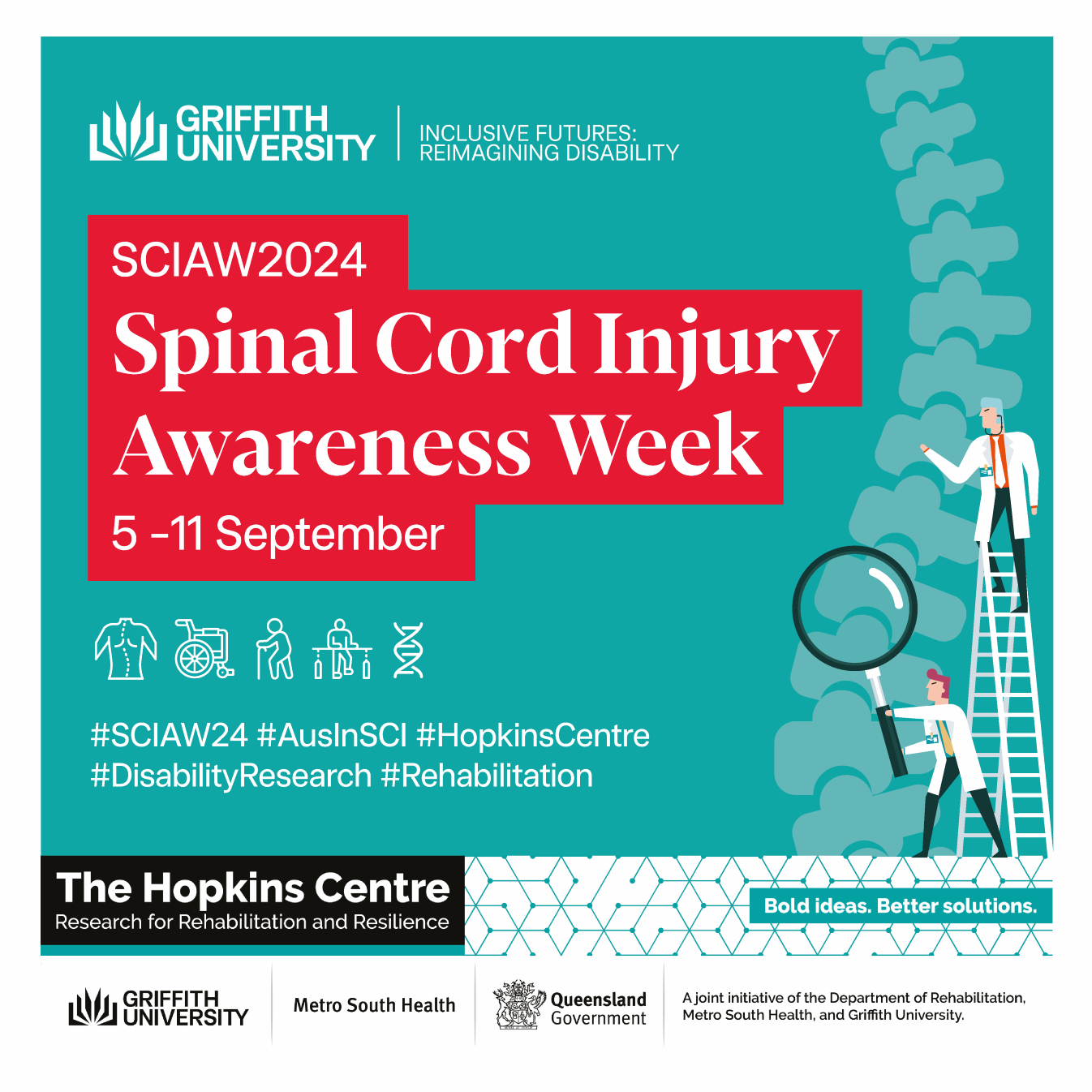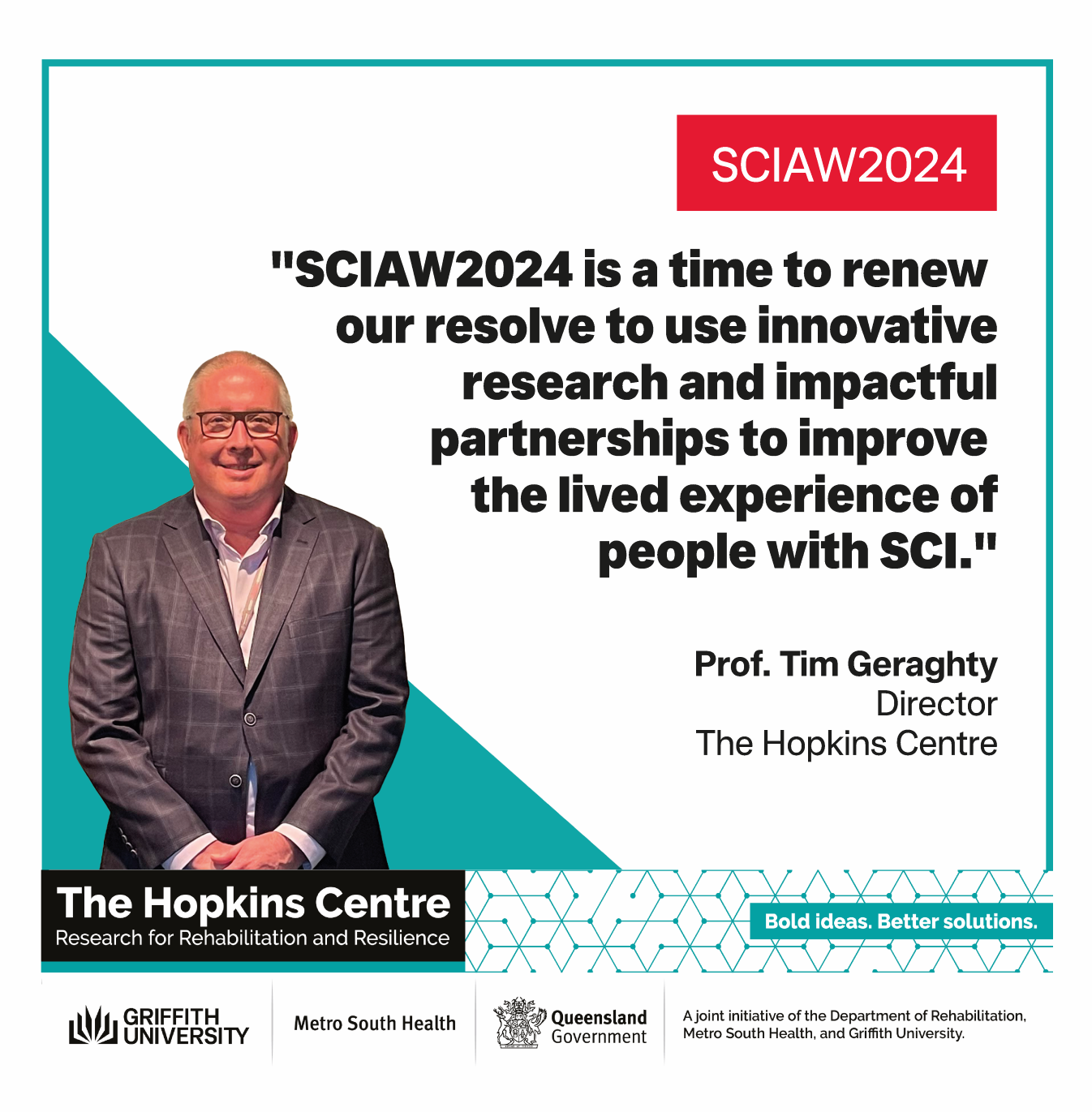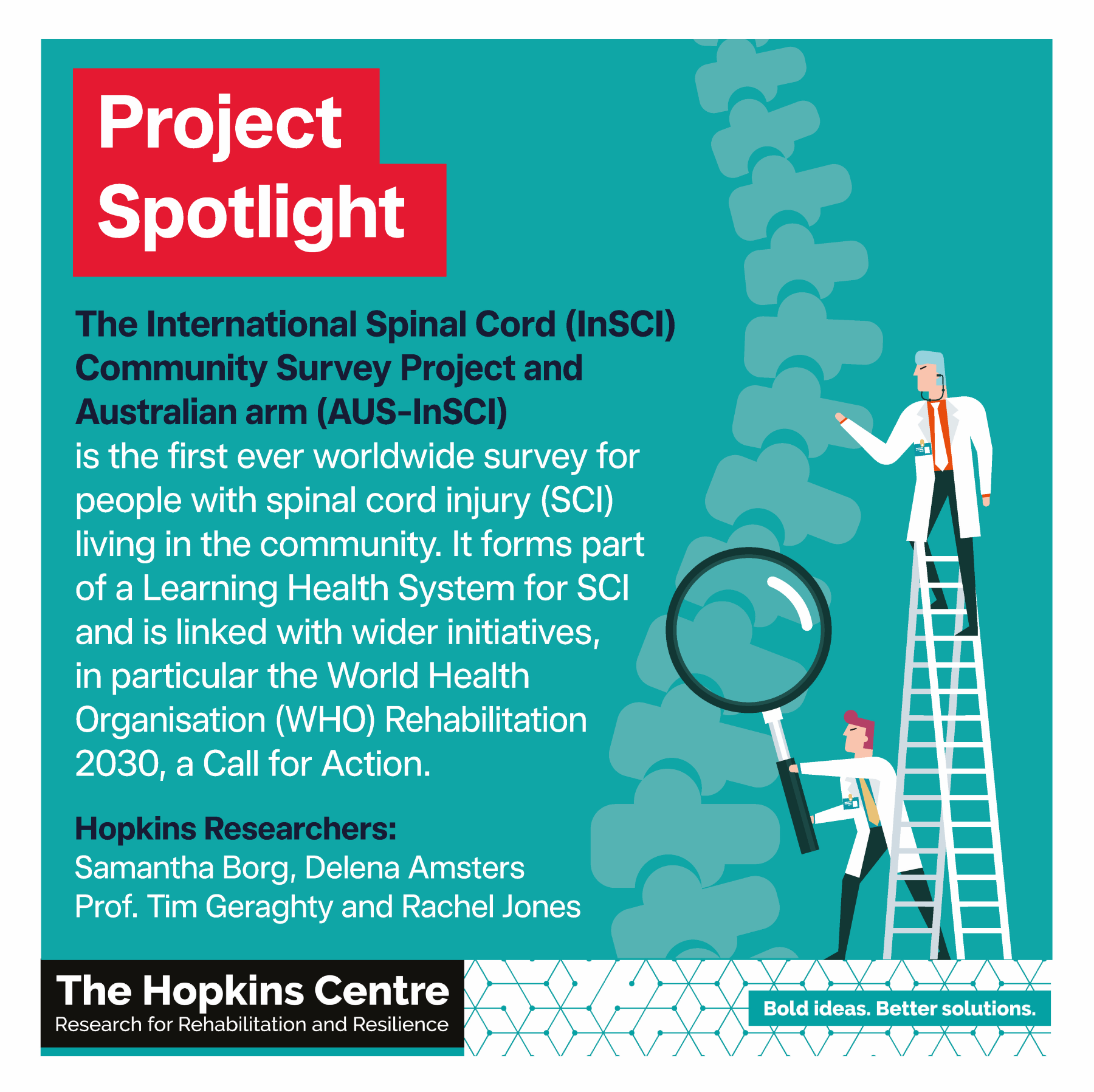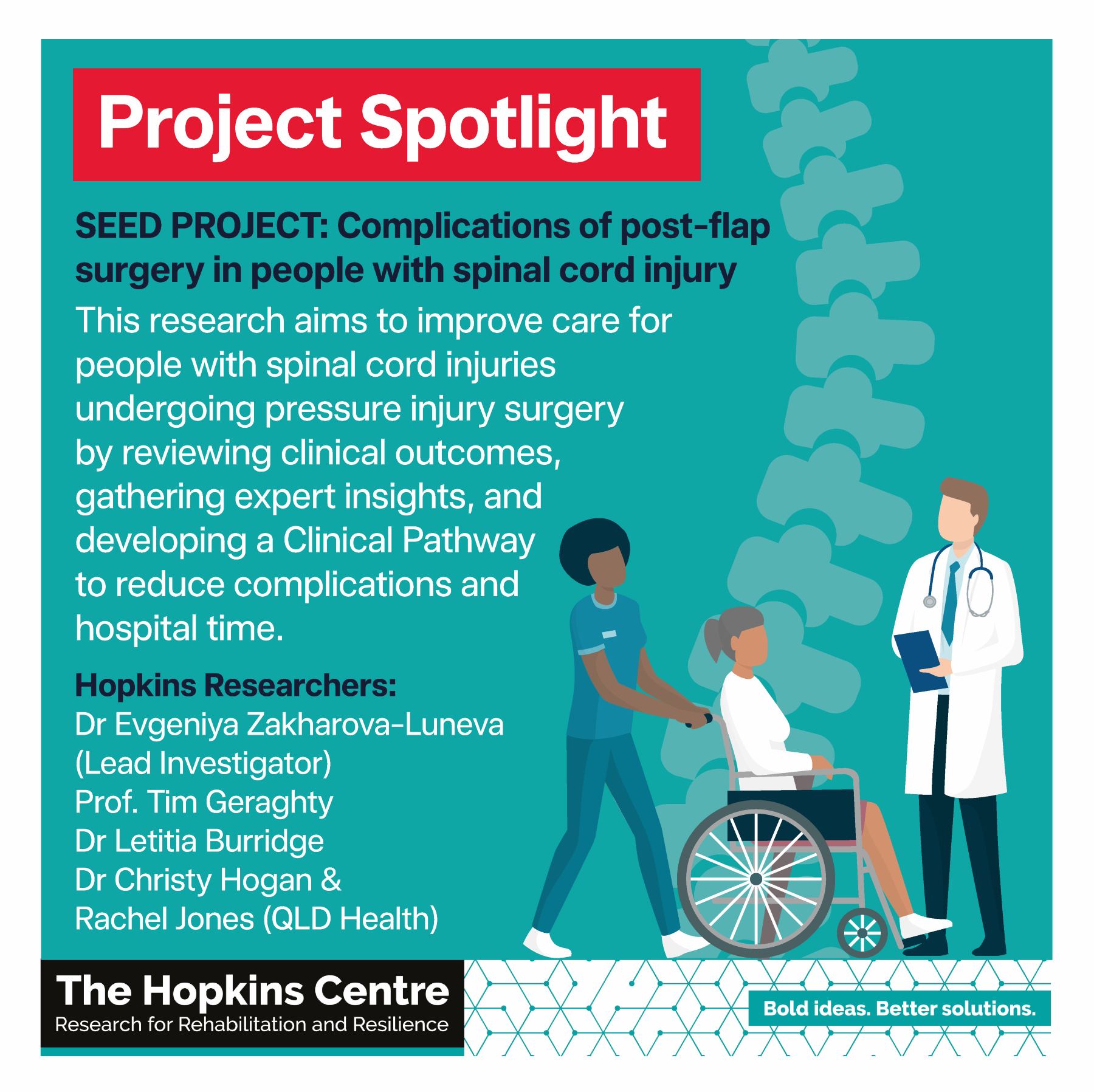Spinal Cord Injury Awareness Week 2024
Director’s Welcome: Spinal Cord Injury Awareness Week 2024

Dear Members and Friends of The Hopkins Centre,
As we commence Spinal Cord Injury Awareness Week (SCIAW) from September 2 - 8, and mark World SCI Day on September 5th, 2024, I reflect on the strides we have made and the journey still ahead in our commitment to understanding, supporting, and improving the lives of people living with spinal cord injury (SCI) and their families and friends.
At The Hopkins Centre, our dedication to driving innovation in clinical practice and research in the field of SCI is stronger than ever. SCIAW is a time that we can reflect on and deepen our resolve to tackle the challenges faced by the people with SCI through pioneering research and effective partnerships that help improve the lived experience. The Centre’s commitment to the model of close-to-practice translational research which prioritises co-design between clinicians, researchers, people with lived experience, service users and industry partners has remained steadfast. Projects like the Aus-InSCI Community Survey and others which you will have the opportunity to read about in this year’s SCIAW24 blog (below), have been instrumental in providing us with data that not only informs research but also has the potential to enable individuals with SCI to voice their needs and concerns, shaping the future of SCI care in Australia and globally.
As we recognise this important week, I encourage each of you to engage with our content on the LinkedIn and X (Twitter) platforms, participate in discussions, and perhaps most importantly, share these insights within your networks. Your advocacy is vital in raising awareness and fostering a society that is more inclusive and supportive of people with SCI and other disabilities.
Our recognition of the importance of co-designed, interdisciplinary research doesn’t stop at this week. I encourage all our members, subscribers, partners and friends to continue to investigate the value of co-design at our next Hopkins Hour event titled “Taking the (co)nfusion out of co-design” coming up on September 11, 2024. By involving those with lived experience in the creation of assistive technologies, we ensure that our scientific advancements are both relevant and impactful.
We will also be exploring the value of interdisciplinary research for solving complex rehabilitation challenges at this year’s Bold Ideas Better Solutions Symposium in October 23. If you have not registered to attend that event, I highly recommend you register today to secure your spot.
As we reflect on our achievements and plan for the future, let’s renew our commitment to making a significant difference through better outcomes and a better quality of life for those living with SCI.
Thank you for your ongoing support and dedication to our mission. Together, we can continue to enhance SCI research and community supports, driving change that truly matters.

Warm regards,
Tim Geraghty
Director, The Hopkins Centre
Project Spotlight: The Aus-InSCI Community Survey Project
As we mark World SCI Day on September 5, 2024, we are proud to highlight a pivotal project led by the Aus-InSCI team at John Walsh Centre for Rehabilitation Research, University of Sydney and in collaboration with other Australian partners, including The Hopkins Centre. The International Spinal Cord Injury Community Survey Project seeks to understand and enhance the lives of individuals with spinal cord injuries (SCI) across Australia. The Aus-InSCI project is part of the International Spinal Cord Injury Community Survey, the first global survey designed to capture the lived experiences of people with SCI.

Understanding the Lived Experience
The Initiative: Planned to be conducted every five years, the Aus-InSCI community survey is a cornerstone of a broader Learning Health System for SCI, linked with global initiatives like the WHO's Rehabilitation 2030. This project aims to gather valuable insights directly from those who know best—people living with SCI.
The Impact: By participating in this survey, individuals with SCI have a unique opportunity to voice their challenges, needs, and experiences. The 2018 iteration of the survey revealed critical insights into health, wellbeing, employment, and daily life challenges faced by Australians with SCI. This data is invaluable for shaping support services, healthcare practices, and policies to better meet their needs.
2024 Survey: A Call to Action
Your responses will help us track changes over the past five years and identify emerging trends and issues and help us to deepen our understanding of the SCI community's evolving needs. Other people may receive it in the next 4-6 weeks.
Why Participate? Your involvement will directly influence the creation of interventions and policies that aim to improve the quality of life for people with SCI. From identifying the prevalence of bladder issues and chronic pain to understanding employment challenges, your input is crucial.
Key Findings and Future Directions
From Data to Action: Previous findings highlighted that many individuals face significant obstacles, from accessing public transport to managing pain and seeking employment. These insights have already begun to inform rehabilitation programs and policy adjustments to address these critical areas. We encourage you to investigate some of the findings related to the 2018-19 community survey.
Dr Delena Amsters presented on the Aus-InSCI Translation Project at a recent Hopkins Hour: Meaningful Research through Stakeholder Engagement on 17 May, 2023 (starts at minute 12:44). Click here to access a PDF version of the presentation delivered during this Hopkins Hour.
Empowering Change
With each survey undertaken, we will gain clearer insights that can guide healthcare professionals and policymakers in developing targeted strategies that support the SCI community more effectively. The 2024 survey promises to build on this foundation, driving further improvements in care and support.
Join Us in Shaping the Future
This Spinal Cord Injury Day, let’s amplify the voices of the SCI community through gaining a better understanding of the findings of Aus-InSCI community survey. Participate, share your story, and help us shape a more inclusive future for all individuals living with spinal cord injuries.
Engage with us, share your experiences, and learn more about how you can participate in the upcoming survey using the hashtag #SCIDay2024.
Together, we can create impactful change that resonates across communities and borders.
Project Spotlight: Tackling Sleep Disturbances After Spinal Cord Injury
During Spinal Cord Injury Awareness Week, we shine a light on a critical yet often overlooked issue affecting individuals with SCI —sleep disturbances. The Hopkins Centre is proud to feature the Seed Project "Sleep disturbances following spinal cord injury: Understanding help-seeking behaviour and co-designing a sleep management resource" as a cornerstone of our awareness efforts this year.
.jpg)
Understanding the Challenge
The Problem: Sleep is vital for overall health, yet for many living with SCI, it becomes a source of major discomfort and distress. After SCI, individuals may have trouble falling asleep, wake up frequently during the night, have disruptive muscle spasms, and experience problems breathing during sleep. These sleep disturbances affect the emotional wellbeing and quality of life of people with SCI, who can struggle to participate in employment and social activities due to a lack of energy.
The Research: Our dedicated team is embarking on a journey to delve deeper into the experiences of individuals facing these challenges. The research team want to understand the support people with SCI have received for their sleep disturbances or, alternatively, the reasons they have not looked for or received support. Following this, researchers, clinicians, and people with SCI will work together to identify how SCI-specific needs related to sleep disturbances can be addressed and their preferences for doing so.
Co-designing Solutions
The Approach: This project is not just about understanding—it’s about action. By bringing together researchers, clinicians, and most importantly, people with SCI, we are set to co-design a sleep management resource tailored specifically to the needs of the SCI community.
The Impact: The anticipated sleep management resource will offer strategies and highlight the supports available for individuals with SCI to better manage their sleep disturbances. This collaborative approach will ensure that the resource developed is not only scientifically sound but also practically applicable and genuinely desired by those they intend to help.
Expanding Knowledge and Support
Knowledge Sharing: Insights gained from this study about help-seeking behaviours and effective management strategies will be invaluable. These findings will guide clinicians and community organizations in offering more targeted and effective support so that people with SCI receive the right type of support when they need it.
Expected Outcomes: With the development of the co-designed sleep management resource, we expect to see an increased awareness and understanding of the complexities of sleep disturbances following SCI. This will not only benefit individuals directly affected but also enrich the toolkit of those providing care and support, fostering a more informed and responsive healthcare environment.
Join Us in Making a Difference
This Spinal Cord Injury Awareness Week, let’s commit to better sleep and better health for individuals with SCI. Stay tuned for more insights as we develop this crucial resource, and join the conversation about the impact of sleep on quality of life after spinal cord injury.
Share your stories and support using the hashtag #SCIWeek2024 and help us bring much-needed attention to this vital aspect of spinal cord injury recovery.
Together, we can help everyone find the rest they need to live full and active lives.
Project Spotlight: Tackling Complications of Post-Flap Surgery in SCI
During Spinal Cord Injury Awareness Week 2024, The Hopkins Centre is proud to spotlight another of our 2024 Seed Funded Research Projects aimed at enhancing the recovery trajectory for individuals with spinal cord injuries or disease (SCI/D). The project, titled "Examining the impact of surgical and post-operative factors contributing to complications of surgical repair of pressure injury in people with SCI/D," seeks to reduce the prevalent complications that arise from flap surgery, a common treatment for severe pressure injuries in SCI/D patients.

.png)
About the Project
The Challenge: For many individuals with SCI/D, managing pressure injuries is a critical aspect of daily care, sometimesrequiring surgical intervention. However, complications from these surgeries can occur in up to 40% of cases, significantly impacting the patients’ recovery and quality of life.
The Research: Under the leadership of Dr. Evgeniya Zakharova-Luneva, this research project embarks on a comprehensive study combining a review of existing literature, a retrospective analysis of patient records from the Spinal Injuries Unit (SIU) at Princess Alexandra Hospital, and input from both healthcare professionals and patients. This multifaceted approach aims to unearth the underlying factors that lead to post-operative complications. This project aims to:
- Identify factors that lead to complications following flap surgery in SCI/D patients.
- Analyse and compare complication rates within SIU to those documented in international studies.
- Utilise insights from patients and clinicians to form strategies that could mitigate these complications.
The project could significantly advance our understanding of and response to the surgical needs of the SCI/D community. By integrating the lived experiences of those directly affected into the development of care protocols, the project ensures that outcomes are both relevant and practically beneficial.
Join Us in Shaping Future Care
This Spinal Cord Injury Awareness Week, let’s recognize and support the vital research being conducted to improve the lives of those living with SCI/D. By addressing the complexities of flap surgery complications, we move closer to ensuring that all individuals receive the best possible care and support throughout their recovery.
Stay engaged with our ongoing efforts and help us make a lasting difference in the SCI community. Share your thoughts and follow our progress using the hashtag #SCIWeek2024.
Some of these projects may also be of interest:
Professor Louise Gustafsson, Research Program Leader of The Centre's Enabling Technologies and Environments team, spoke about this project at Bold Ideas Better Solutions Symposium, 2023. This is a collaborative project between The Hopkins Centre and Spinal Life Australia. Click here to view Prof. Gustafsson's BIBS23 presentation on the PhotoVoice project, where she was joined by co-presenter Mr Colin Mackereth, Peer Support Officer, Spinal Life Australia.
This project, led by Matthew McShane, explores the implementation of the Design Café within a community-based setting. People with a disability often encounter small tasks throughout everyday activities that prevent them from finishing the activity. Throughout a day, these small hassles have a cumulative impact for the individual who is left feeling frustrated and deflated. These small tasks are often overlooked, fall through the cracks or are not addressable with existing assistive technology (AT). The Design Café promotes co-designed solutions for these everyday hassles/issues. We focus on designing for ability, by creating meaningful and lasting design solutions to enhance everyday items for people with disability.


